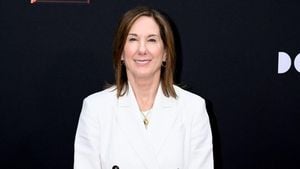On the third anniversary of the Ukraine conflict, the United Nations Security Council took significant steps by approving a resolution put forth by the U.S., which calls for the "rapid end of the war." Notably, this resolution did not designate Russia as the aggressor nor reaffirm Ukraine's territorial integrity, according to reports from various news agencies.
The resolution prevailed with 10 votes in favor, including Russia's, and no votes against, as France, Slovenia, Greece, Denmark, and the United Kingdom chose to abstain, thereby allowing it to pass without opposition. This marked a shift from earlier positions observed during recent discussions at the General Assembly, where support for Ukraine's sovereignty was more heavily emphasized.
French President Emmanuel Macron, speaking shortly after the resolution's approval, expressed optimism, stating, "The truce in Ukraine could be reached within weeks." He noted, after his meeting with U.S. President Donald Trump, the importance of defining security guarantees for Ukraine as part of the peace process. Macron conveyed to reporters, "This peace cannot mean the surrender of Ukraine, as we must avoid leading to a world where only the strongest prevail."
Trump, amid complex diplomatic maneuvers, mentioned potential collaborations between the U.S. and Russia, hinting at discussions of rare earth minerals and economic partnerships post-conflict. He indicated there may be grounds for extensive interaction between Washington and Moscow concerning these minerals, aligning with speculation about Russia's interest in reviving trade relationships.
The latest developments have seen Ukraine's Foreign Minister Mariana Betsa warn international partners, "If aggression is justified and the victim is blamed for their resistance and will to survive, no country is safe." These remarks highlight Ukraine’s precarious situation and the diplomatic tension surrounding international perspectives on the conflict.
While the U.N. resolution emphasizes the urgent need for peace, it lacks explicit references to accountability for the aggression faced by Ukraine, which has drawn criticism from various quarters, particularly among European allies of Ukraine who feel it undermines their support for maintaining territorial integrity. The absence of these important elements has raised concerns as the situation continues to evolve.
Prior to the UN vote, the General Assembly had passed another resolution, reaffirming support for Ukraine's sovereignty and highlighting the defeat of Russian aggression. This assembly saw 93 nations back Ukraine, with 18 opposing the resolution and 65 abstaining, showcasing the divided global response to the conflict.
Starmer's Take on Defense and Unity
British Prime Minister Keir Starmer, reflecting on the situation within the U.K. Parliament, indicated his intent to address the unity among allies and the necessity of addressing "threats" posed by Russia with sustained strength. He stated, "The threats piling up on Europe historically fall on our shoulders," emphasizing the role of NATO as equal to the security framework within Europe.
Starmer's remarks coincide with the upcoming discussions among European leaders aimed at streamlining defense strategies and military assistance to Ukraine, scheduled for London, demonstrating the urgency around coordinated international responses to Russian aggression.
Meanwhile, sources within the Italian government clarified their position, indicating the current absence of any plans to send Italian troops to Ukraine. They assert, "The presence of Italian forces is not on the agenda." This reflects broader hesitance from various nations about direct military involvement as they deliberate over peacekeeping missions versus reinforcing Ukraine's defenses.
Recent statements from Russian officials indicate they are receptive to peace talks involving the European Union. Russian President Vladimir Putin characterized Ukrainian President Volodymyr Zelensky as increasingly detrimental to peace efforts, dubbing him "toxic." This rhetoric indicates the deepening mistrust and challenges surrounding any meaningful dialogue aimed at resolving the longstanding conflict.
The Road Ahead
The broader consensus among international leaders remains focused on aiding Ukraine, with France highlighting its significant financial contributions compared to the U.S. President Macron asserted, "To be frank, we have paid 60% of the total aid package, and this is real money," pushing for recognition of European support.
The dynamics leading up to negotiations showcase the complexity of alliances and positions, with the U.S. adopting what Russian officials describe as "a balanced approach" at the U.N. This alignment could serve as groundwork for potential future deals, especially as the U.N. examines Russia's aggressive actions.
Throughout these discussions, Ukraine continues to rely heavily on international support. President Zelensky has reiterated the call for unity among European allies, stressing the importance of not losing momentum. He stated, "We must not let discord weaken our resolve to support Ukraine and the significant sacrifices made by its people over the past three years."
Strengthening this narrative, the upcoming summit set for March 6 will be pivotal as leaders reflect on the past three years of conflict and the way forward to secure Ukraine's autonomy and stability. With the backdrop of significant diplomatic engagement and high-stakes negotiations, there is cautious optimism for future prospects of peace.
While the immediate outcome points toward the necessity of establishing dialogue, the road toward sustainable peace remains fraught with political maneuvering and humanitarian concerns. The international community watches closely, hopeful for resolutions, yet acutely aware of the challenges at every turn.



